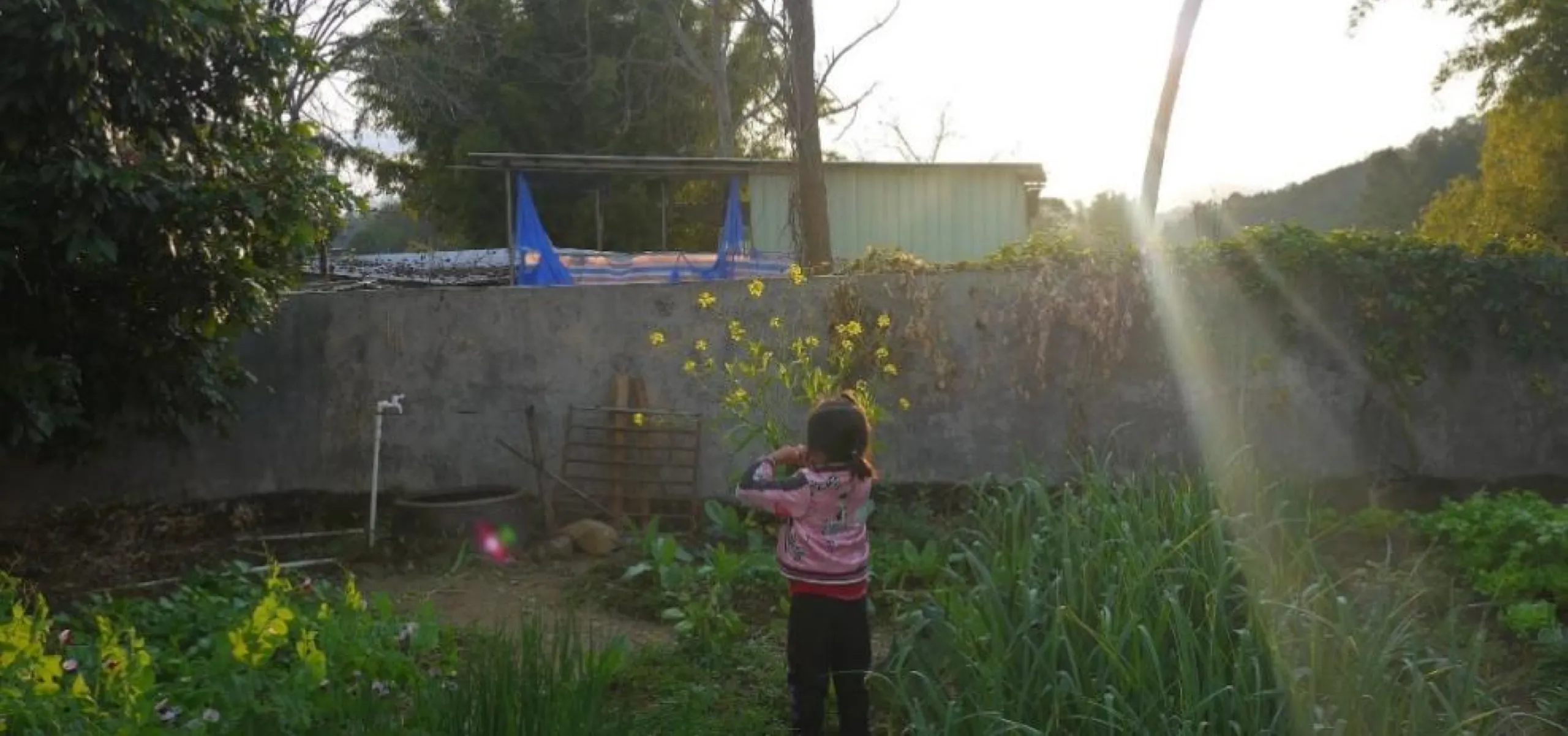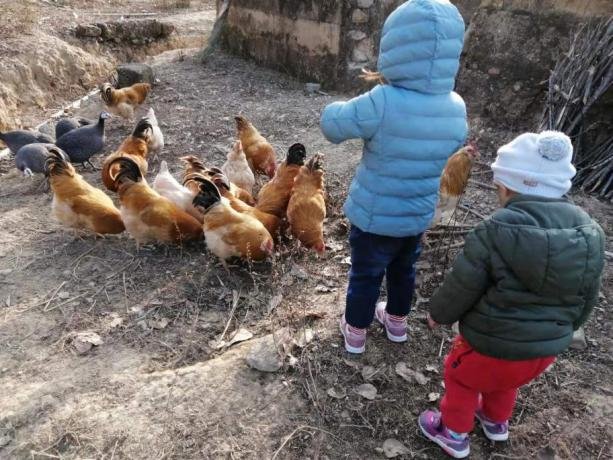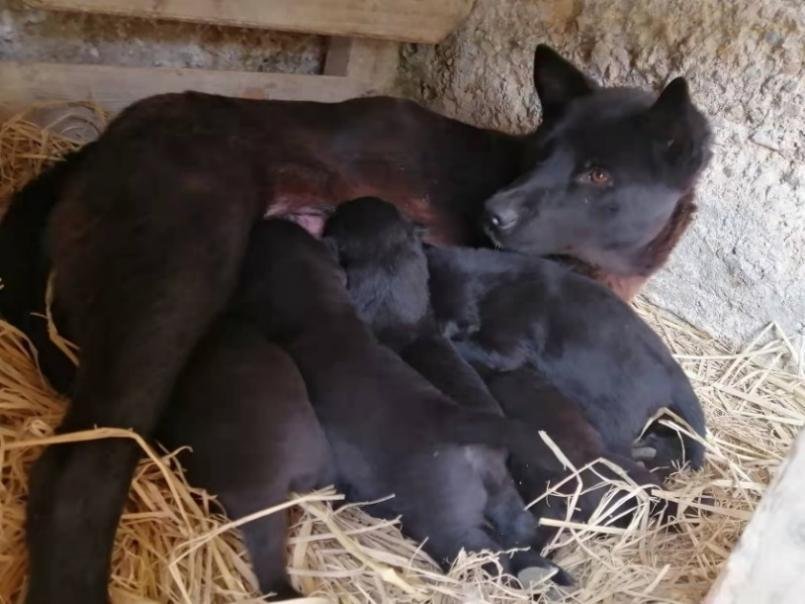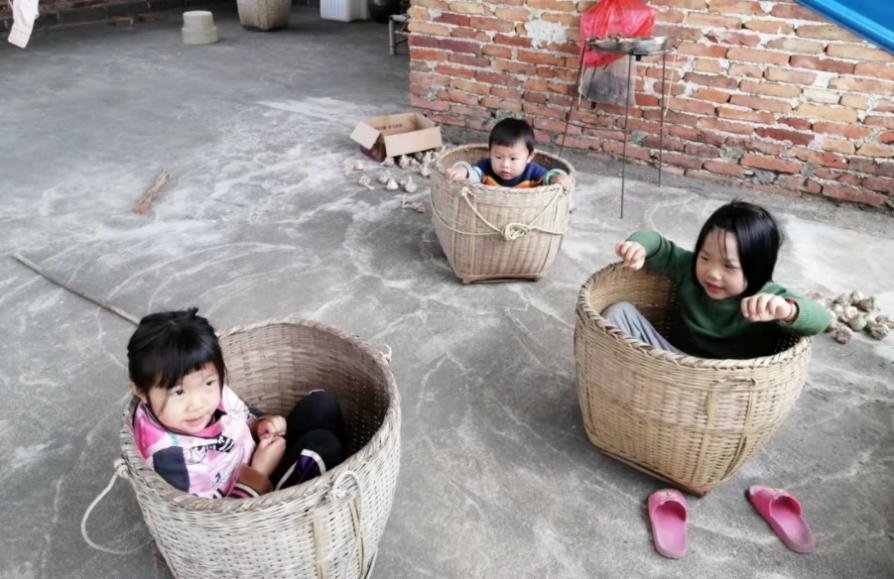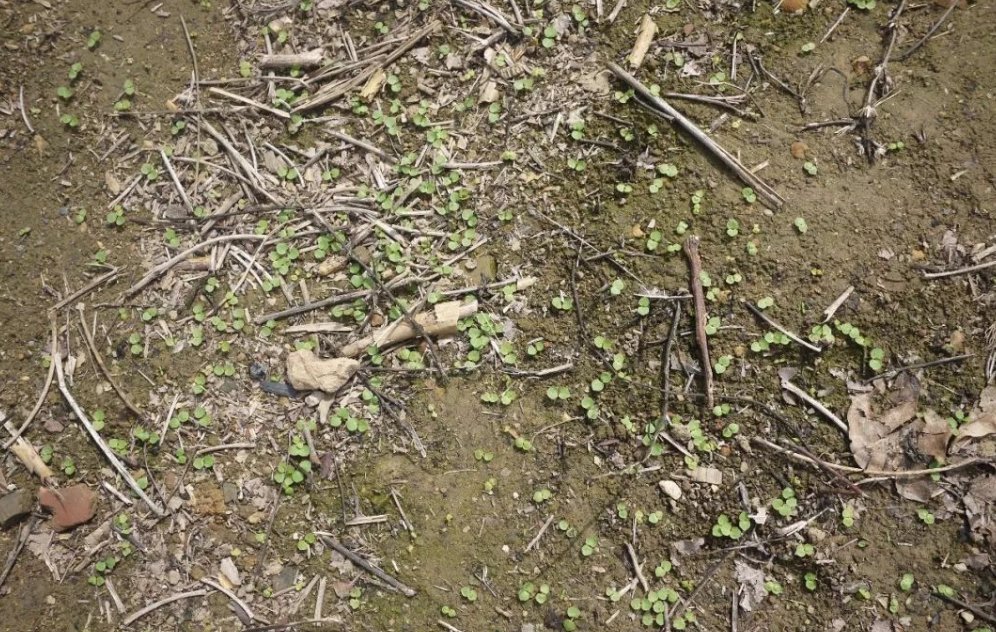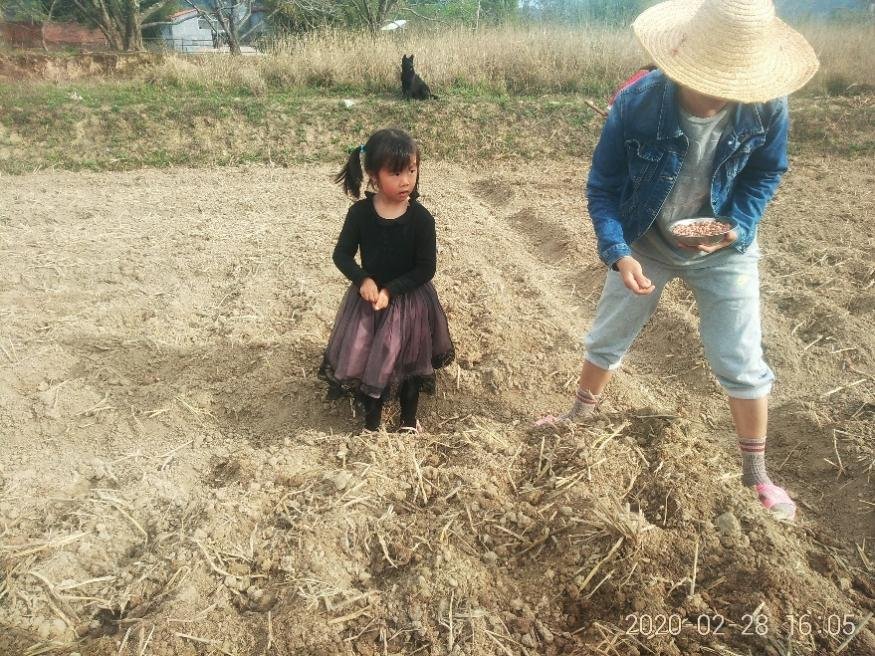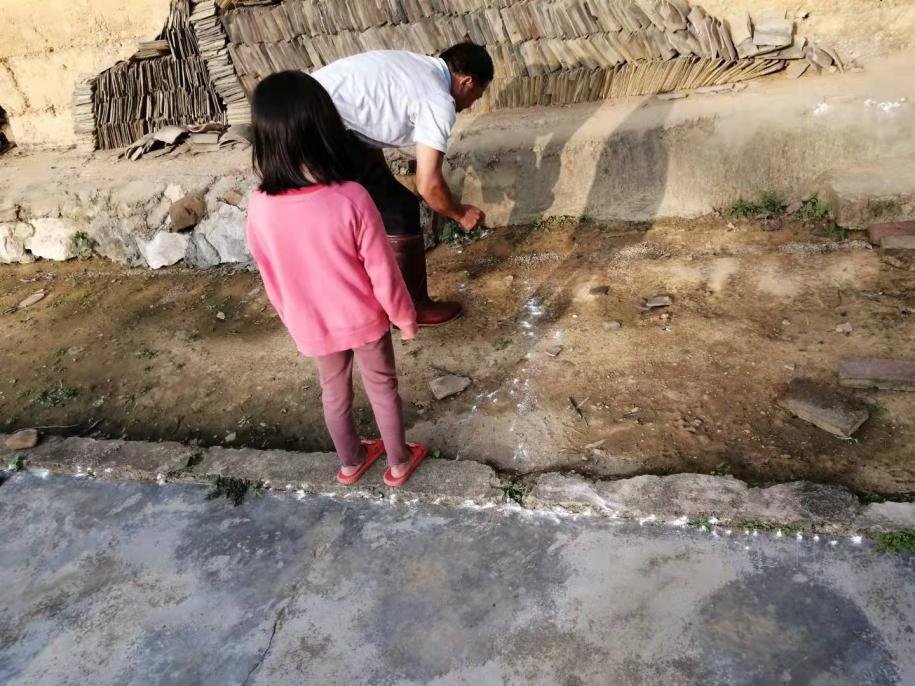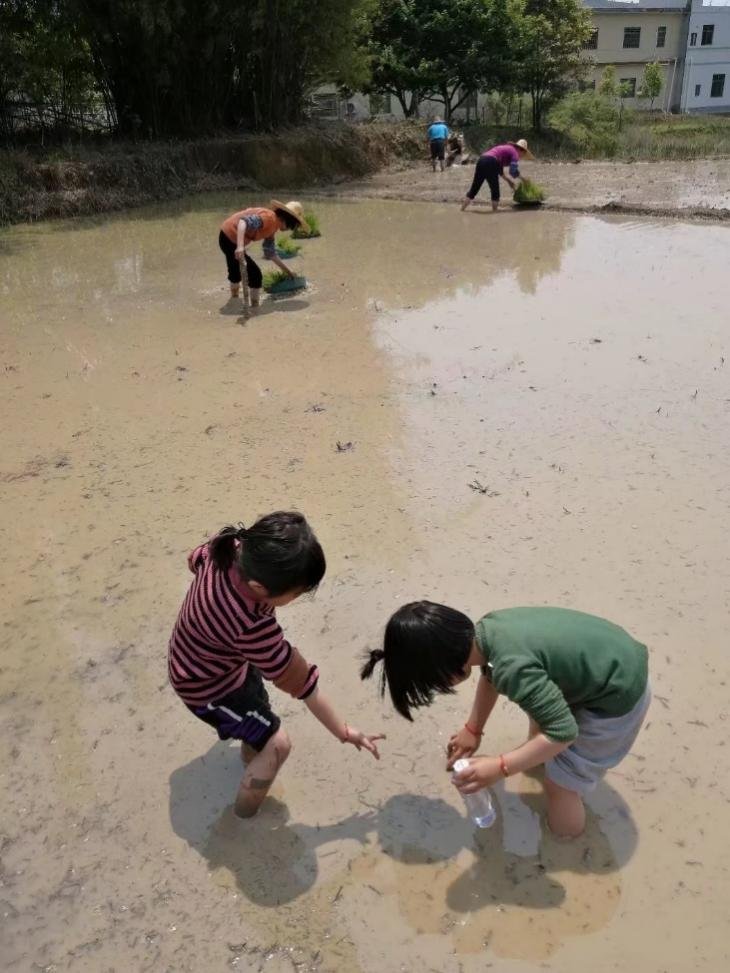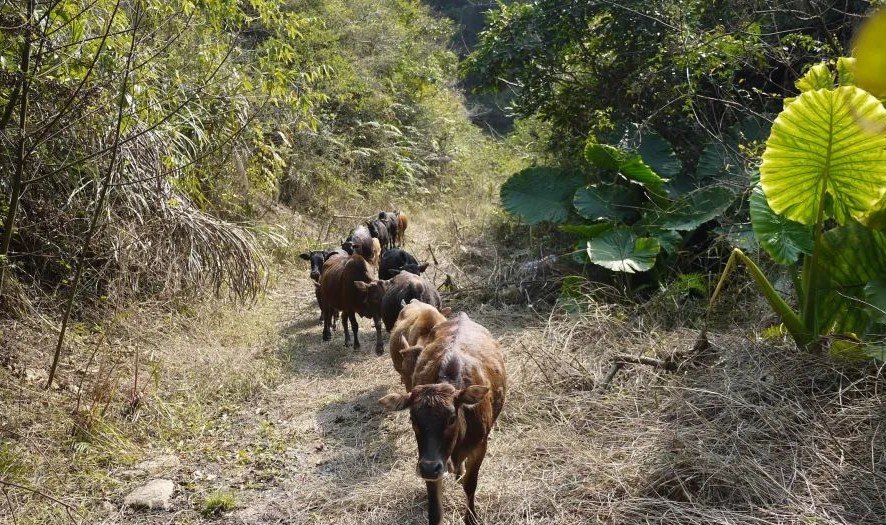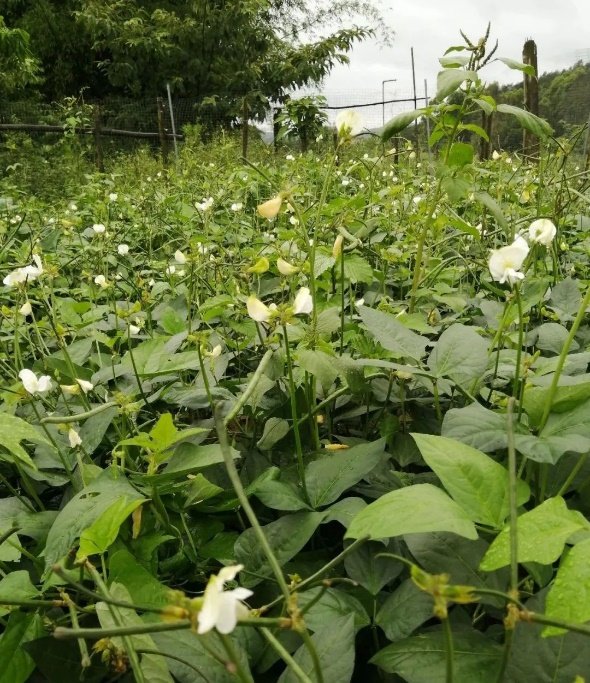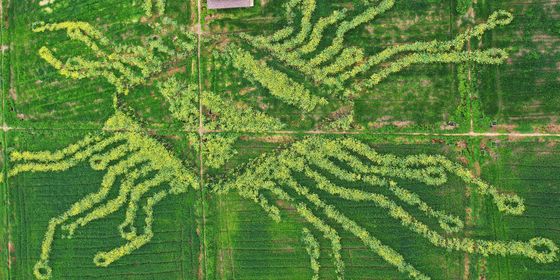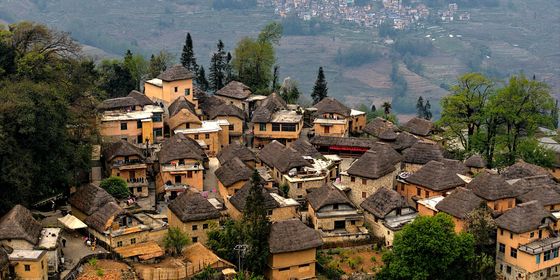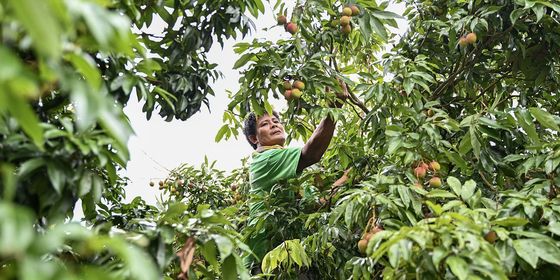A six-month stay in a Chinese village helped a family return to their roots
After the Lunar New Year of 2020, I was detained in my home village for several months. I lost my job to the pandemic and my children’s kindergarten suspended classes. I was constantly bombarded with bad news from the internet: the human toll of the pandemic, the hardships of my compatriots on the front lines, the laments of survivors. I could only cope by focusing on what was in front of me. I hadn’t spent this much time in the village since before my college days.
My ancestral home is a small village in northeastern Guangdong. A minor provincial road passes through it; the county seat is a dozen kilometers south, and further south is the Pearl River Delta. Our neighbor to the north is Jiangxi, home to a population of Hakka people. There are more hills than fields, so the villagers rely on the mountains for much of their subsistence. Starting in the ’90s, many able-bodied youths left for cities like Guangzhou and Shenzhen to work as laborers. After the turn of the millennium, they started buying homes in the city and moved away for good. Now, there were only a handful of older people and children left in the village.
In the past few years, I’ve gone back to my home village every Lunar New Year. Though the ordinary routines were withering away, the village staged a remarkable revival during the festival. People would come back from the cities to pay respects to their ancestors and visit relatives. The air came alive with their stories.
Over the course of this long stay during the pandemic, I started recording the mundane details of life here—every blade of grass and stick of wood. This experience rewarded me with the ability to see my home village through new eyes.
1 / 8
In the days leading up to Lunar New Year’s Eve in 2020, my husband and I took our two kids back to the main town of our home county, preparing to celebrate the holiday there before returning to the city for work and school. When the pandemic broke out, we had to quarantine in an apartment we owned there. Our children quickly exhausted their entertainment options and kicked up a fuss, begging all day to go out. Finally, we decided to go to the countryside, to my parents’ village.
There weren’t many cars on the road. When we passed the highway checkpoint, workers in hazmat suits reached into our car with thermometers. As we merged onto the provincial road and then the narrower county road, there was no trace of the festive atmosphere of years past. We only saw the occasional group of people gathered under the eaves of houses to sun themselves and chat, as well as giant red banners with anti-epidemic slogans.
The third day of our return, a village cadre came door-to-door with pamphlets, informing us that starting that same day, relatives and workers from the outside would be forbidden from entering the village. This announcement sealed off the village from the rest of the world. Every day, rain or shine, a doctor would come take the temperatures of a family that had returned from Hubei province, then the center of the pandemic. I tried to describe the pandemic to my daughter, giving her a sense of the historic moment we were part of.
We were lucky enough to have been able to return to the village after a week of quarantine in our apartment, and renew our intimacy with the sun. From the morning they stepped out onto the soil, my 5-year-old daughter Yang and my 2-year-old son Zhun were as joyful as birds freed from their cages.
After a couple weeks, my husband and my younger siblings went back to work in the city, leaving me and the two children to our slow country life.
The village didn’t offer much in the way of entertainment, but the children were rarely bored. On clear days, they could occupy themselves with a pebble and a head of cauliflower. When it rained, they could turn a puddle into a stage for reenacting scenes from Peppa Pig.
Whenever we came back from a visit, my parents were usually the only ones at home; the rest of the village inhabitants were also old people their age. But even this quiet winter village had its own soundscape. Every morning at first light, we opened our eyes to the rooster’s crow. The morning sun would scatter its honeyed light across the courtyard. After the kids had their breakfast, they would run out to the clearing behind the house to feed the chickens.
The chickens would forage among the dry grasses in that early dawn light. Instead of inciting alarm, the children’s arrival would produce a crescendo of clucking. A few ducks sat peacefully behind their wire netting, as if savoring the sunlight. Yang told her brother, “Did you know they’re asking their mom and dad if they can go swimming?” Hearing this, the adult ducks would quack knowingly.
On our way back from the fields, we would pass a wooden ladder propped against the corner of the wall. After inching her way to the top of the wall, my daughter yelled, “Mom, I see a flower garden!”
Actually, it was my mother’s vegetable garden. Modest in size, it had all the common winter vegetables: yellow cress, radishes, peas, mustard greens, garlic greens, scallions, leaf lettuce… At lunch, when my mother went to pick vegetables, she would trim up a lettuce core for Yang. This was a coveted treat from my childhood of scarcity, but my daughter had never acquired a taste for its clean vegetal flavor, so she cast it aside after a single taste. Kohlrabi, daikon, and vegetable stalks could all be eaten raw, the flavor unforgettably transformed by the biting cold.
I taught Yang the names of the vegetables, in both Mandarin and our local dialect. For example, villagers would call the lush patch of mint by the garden gate fenchen. “Fenchen with duck” was a prized dish from my youth. Yang parted the radish leaves, exposing a sliver of white. She squealed, “Radish!” (Yang loves eating radish.) The cabbages also attracted her attention. My mother loved to plant cabbages—perhaps it was the sense of accomplishment from growing a large, handsome head.
The king of winter vegetable pairings was celery with garlic greens. They worked well with all kinds of meat, and were excellent stir-fried with slices of cured pork belly. Celery was also the soul of the soup we made the morning of New Year’s Eve: a chicken and shiitake porridge simmered over a wood fire. For Yang, these vegetables had not yet taken on this layer of meaning. Her recognition was limited to whether she had tried something before. She had eaten goji soup, so she could identify goji berries, and peas were more familiar still—not only did we eat them often, but she also knew them from “The Princess and the Pea.” This time, she learned their vernacular name, xuedou (snow pea). At the time, the snow peas were producing flushes of flowers: “Wherever there was a flower, there’d be a pea.”
In the afternoon, we discovered two dried-out luffas by the garden wall. I told Yang: “When the luffa is still young, it’s tasty stir-fried or boiled in soup.” I picked an old luffa and found a wooden stick, shattering the exterior to expose its snow-white fibers. The intertwined meridians look almost like a dense neural net—nature’s wondrous creation. I slowly peeled away the dried flesh at one end, exposing a few small holes. Streams of white seeds came pouring out. My two little ones scrambled to catch them in their palms, but their hands quickly overflowed.
Almost without thinking, they started putting the luffa seeds in their mouths. I suggested, “Let’s put the seeds in a bag. We can plant them tomorrow.”
The next day after breakfast, Yang wanted to plant the seeds. I found a hoe in the storage room and took her to a nearby patch of soil. I cleared away the weeds and dug a small hole. She planted and covered the seeds before fetching some water from the spigot and watering the soil.
We returned brimming with anticipation for the sprouts, flowers, and fruits to come.
2 / 8
After a few days of inactivity, my mother said, let’s make ban. In the Hakka dialect, ban refers to various sticky rice snacks.
No sooner said than done: My father took glutinous and sticky rice (nuomi and zhanmi) soaked overnight and ground it into flour. My mother went out and picked some banana leaves. Large and glossy, the leaves keep the ban from sticking to the steamer. Of course, the two children couldn’t resist the opportunity to play with the leaves. They “helped” by shredding the leaves, drawing protest from my mother: “Grandma won’t have enough to make ban!”
When I picked up a banana leaf, I found that my hands still remembered how to play with them. I tore the leaf into strips along its prominent veins and folded the strips over one another. Yang wanted to learn, but burst into tears when she couldn’t figure it out.
Once the banana leaves were ready, my mother kneaded the rice flour and rolled it into balls for making radish ban. Yang wanted to get in on the fun, so I pinched off some dough for her to play with. I told her that the little rice balls she made would be all hers once they were steamed.
After the ban were shaped, they had to be steamed in a large pot over a wood stove. I lit some pine needles, and the fire crackled to life with a “whoosh.” I hurried to add bamboo chips and another handful of pine needles. When the chips were fully ablaze I added some sticks of firewood. The fire baked my face until it was toasty. These weren’t refined flames; they roared furiously as they extracted the life force of the wood.
In addition to firewood, the kitchen also had a stock of lumber trimmings. I tossed the kids a few pieces of scrap wood. “Look, woodshop!” Yang took the piece of board and started playing it like bamboo clappers. Then she and Zhun pretended that they were in the woodshop class at nursery school.
After returning to the wide-open countryside, the children gained unfettered use of their limbs, jumping and climbing all around. Faced with these two restless little monkeys, my father found a long timber log he’d carried down from the mountains. He sawed it to length, planed it smooth, and built a simple swing set against the garden wall so they could play to their hearts’ content.
—
What the children liked even more than the swings was my father’s pair of black dogs. They bonded immediately, the dogs bounding up to them like they were greeting old friends. I held them off out of concern, so the children and dogs stood and sized each other up. Zhun cried in excitement, repeating “doggie!” over and over.
Soon, the children had their own names for the dogs: First Dog and Second Dog. First Dog was a male. He’d been taken to the vet when he was sick the year before, leaving him wary of humankind. My father wouldn’t let the kids near First Dog, fearing that he would hurt them. Second Dog was a female and more sensitive. She went around with her head down, docile, receiving all manner of head-mussing, ear-pinching, and tail-tugging without protest. Whenever we ate, we would have Second Dog sit at our feet and slip her scraps of food.
Around two or three in the afternoon, my father readied his work basket and walked out of the garden gate. He was heading up the mountain to herd the cows. The two dogs followed, one in front and one behind. They gamboled their way up the mountain, darting off into nooks and hollows, playing chasing games. My father paused in a mountain hollow and circled the herd; the dogs, perhaps having tired themselves out, flopped down nearby to take in the breeze.
“It’s dead quiet on the mountain, but it’s less scary when you have the dogs by your side,” my father told me one time when we went up the mountain together.
Every day at nightfall, the two children would appear at the end of the village road just outside the gates, waiting to greet their grandfather. As soon as they saw those two black dogs running in the distance, they knew their grandfather wasn’t far behind.
At the end of February, Chun Sheng the rice-bran seller pulled up on a motor-tricycle. Seeing the two glossy black dogs by the gate, he said. “I didn’t know your family had such a nice pair of dogs. During Winter Solstice, someone was looking for dogs but couldn’t find them anywhere, even after they raised their price to 2,500 yuan.”
Hearing this, my mother had an idea. “Then could you ask around for us and see if anyone is still looking for a dog? I’m afraid the male dog might hurt the two kids in our household.”
Two weeks later, Chun Sheng came limping into the living room. He pulled a phone from his pocket and asked, “Would you take 1,350?”
My father agreed, but my mother remembered that the buyers had been offering 2,500 yuan; wouldn’t we be missing out? She hesitated. “How about another 50?”
Chun Sheng picked up his phone and called back, but the other party wouldn’t do it. So my mother gritted her teeth and said, “If they won’t pay, then I won’t sell.” I approved of this. I liked the image of my father going up the mountain with the two dogs at his side.
At the beginning of March, with the fallout from the pandemic still unfolding, the neighboring town started to seize chickens and kill dogs. Soon, a village cadre was knocking on our courtyard door, delivering a red pamphlet. The chickens would have to be fenced in and the dogs tied up and kept inside. If any animals were found outside, they would be killed.
So my father tied the dogs up under the old house, where they responded to their confinement with nonstop howling and pacing, leaving plum-blossom paw prints in the freshly plowed ground outside the house. After a while, when the panic had passed, he opened the iron gate back up and took them up the mountain with him as before.
The children became close with the two dogs, especially Second Dog. No matter how the children teased or tormented her, she would always lick their faces. The children were forced to hold her head with their right hands and wipe their faces with their left. My mother anxiously pulled Zhun away. “Don’t bother her, she’s got dog babies in her belly, watch out or you’ll get bitten!”
Second Dog’s belly grew larger and larger, but she kept going into the mountains with my father. One day, my mother said, “This dog looks like she’s about to give birth, she’s made herself a straw nest in the corner by the door.” Sure enough, we soon woke up to find five smudges of black huddled in the straw by Second Dog’s side. Their smooth little bodies were no bigger than rats; their eyes were still closed, and they squeaked incessantly.
Second Dog did her postpartum confinement just like a human mother, but she spent only two days resting before she emerged. Her mind was always on her pups. She never left for long, taking only a short loop around the courtyard or drinking some water before returning. As soon as she was back in the nest, the puppies would latch on to her nipples and suckle for all they were worth.
After a couple weeks of this, Second Dog’s eyes had sunk deep into their sockets. My father said, “The pups are milking her to death.” He had my mother feed her more meat and soup bones to replenish her nutrients.
After another week, the puppies had grown significantly. Their eyes opened. No longer restricted to staying in the nest and drinking their mother’s milk, they now ventured out. A few of the puppies meandered their way to the threshing ground, where Zhun scooped them up gingerly into his arms, looking like he’d caught a snowflake and was afraid it would melt.
The puppies were getting more active by the day. Soon, even the big plate of rice my mother brought them was no longer enough. My father said, “If this continues, there won’t be enough left for us to eat. And who knows how long this pandemic will last?” When the next market day came around, he brought the puppies to town and sold them.
When Yang and Zhun saw that the puppies were missing, they burst into tears. “Where have the puppies gone?” My father made up a story, saying that someone had stolen them. When Yang heard this, she was inconsolable.
3 / 8
At first, due to rules against visiting our neighbors, we only played right outside the house. Later, as the weather warmed and the restrictions loosened, the kids couldn’t resist the temptation to explore.
Yang’s first friend in the village was the older woman from next door. One day, as the woman watered her fruit seedlings on the other side of our wall, she popped her head over and teased Yang. “How did you get so pretty?” When Yang heard this, she took an immediate liking to this neighbor.
That evening, Yang told me she wanted to go play at the neighbor’s house on the other side of the wall. She went out the courtyard gate and made a beeline for the back door. I yelled after her, but she didn’t seem to hear: “I want to see my big friend Auntie Y!”
I surreptitiously followed, watching my daughter as she dropped in on a friend for the first time. Soon she was eating sesame sticks and fried rice cakes in her “big friend’s” living room. This was Yang’s first time crossing the threshold of our courtyard and connecting with the outer world.
Some time later, a little girl who lived in the upper village came and plopped herself outside our courtyard gate. She and Yang started talking through the metal bars.
“I’m in year 2 in nursery school, what about you?”
“I’m in year 3.”
As they spoke, Yang let the other girl into the courtyard. The two of them played on the swings before running over to the threshing ground to play with pebbles. Wherever they went, Zhun clung to them like a tick. The girls complained: “Zhun is such a pest,” “Zhun isn’t allowed to touch our mud…” Like older kids everywhere, they were always trying to dodge the younger ones.
The next morning, before Yang had even gotten up, the other girl had ridden her bicycle to our doorstep. “Yangyang, are you up yet?” Hearing this, Yang immediately crawled from under the covers. The two of them sped away on their bikes, heading down the paved village road that ended at the other girl’s house. After a while, the two bikes came whizzing by our house again.
The girls’ friendship was fully underway. Hugging dolls to their chests, they went into the bedroom and latched the door. I could only listen through the crack.
“Mom, little sister is hungry.” Yang’s milk-sweet voice came through the door.
“I’ll come feed her,” the other girl replied.
During her evening bath, I asked, “Between you and Ling, who was the mom and who was the baby?”
She giggled, “She was the mom and I was the baby.”
Just like when I was young, they didn’t need to be taught how to play house—one of the mysteries revealed only to children.
A few days later, Yang came crying to me at lunch. “Ling doesn’t want to play with me anymore.”
“Why won’t she play with you?”
“I don’t know,” she said, distraught.
But one morning not long after, Ling’s voice came again from beyond the courtyard wall: “Yangyang, are you up yet?” Hearing that voice, Yang forgot any awkwardness and rushed out to meet her friend. Soon, the two little figures were darting around the house again.
Their friendship continued along this pattern: Three days of peace, two days of bickering. After a few days, I noticed that Yang had started to speak the village dialect. Her tone and mannerisms were of a completely different person, like she was unconsciously imitating her new friend. “Don’t copy Ling all the time! You’ll forget how you speak,” I told her. She laughed and ignored me. I later realized that I was worrying needlessly: Mimicking each other is part of the thrill of new friendship, and it was also a mark of her integration into village life.
4 / 8
After the Yushui solar term ended in March, the weather turned mild and humid. At first it drizzled, muddling the boundaries between earth and sky; people seemed to lose their bearings as well. When the rain stopped, we could hear birdsong and see shadows flitting between the bare branches. Below the eaves, a few swallows returned to their old nests. When Zhun spotted them, his eyes lit up. A new layer of green sprouted up from the wet earth around the house. Nature’s Creator is never late; spring was making its quiet entrance.
After a few days, the rain got heavier. When the children got up in the morning, they would stand in the doorway to watch the raindrops leave little craters in the ground.
“This should be enough to save the fish,” I said, thinking about the almost-dry fishpond.
But my father said, “It needs to rain like this for two or three days before you get flowing water. It’s already been dry for over six months—there hasn’t been a big storm since last August.”
After a full day of rain, the mountains in the distance were cloaked in mist. The air was clear and cold, smelling of renewal.
The children were also going through a period of transformation. Yang, who once spoke only Mandarin, had learned to talk like a villager. Zhun, who had been chubby, pale, and pampered, was now a ruddy village boy, scampering about with bare feet.
I marveled at how well children adapt to their environment, and how the environment changes them in turn.
—
Market day fell on the ninth day of the second lunar month. The preventative measures had relaxed significantly. The village’s epidemic prevention tent was still up, and a few kids had repurposed it as a play site. Although the market was still smaller than before, basic goods were available again.
Plans made in spring determine the gains of the entire year, so my father started to prepare for the spring plowing. He woke up early and took a motorcycle to the market, buying string bean, eggplant, and bitter-melon seedlings for my mother to plant in the garden. There were also about 30 fish fry that he released in the fishpond.
In the afternoon, he took rice specially purchased from the agricultural distribution center and soaked it in a bucket. The rice needed to be soaked for a full day and night, then put into a bamboo basket to drain any excess water. Once the soaked seed had sprouted, it was ready to be sown in seed beds.
The spring plowing comes with a wide variety of tasks. Typically, two weeks after the Lunar New Year, people would start hoeing weeds from the raised paths between the paddies and burning them, leaving clean fields ready to be softened for planting by the spring rains.
My father said that because there was an extra day in the fourth lunar month this year, everything would have to be pushed back. After the second day of the second month, when the fields were showing signs of life, we started hearing the incessant sound of tractors plowing. Once he had sown the seeds, my father used a rototiller to turn the soil over, tilling about one mu (667 square meters) of drought-hardened soil. He said, “There’s no rush to plant—Jingzhe, the ‘Insects Wake’ solar term, isn’t here yet.”
I asked, “What happens if you plant before Jingzhe?”
“Before Jingzhe, there is still a chance that we’ll have a hard frost followed by rain. If that happens, the seeds will rot in the ground.”
“If you’re going to talk cold, it still gets cold during the Qingming period! Weighing hemp at Qingming, the plowing twins froze.” My mother interjected a proverb into the conversation.
My father retorted, “You don’t have to worry if it gets cold at Qingming, because everything will have grown big enough by then. Not like right now, with the new grass still sparse, meaning the humid weather hasn’t fully returned yet. When it returns, you get a thick layer of water vapor, the walls and mirrors are covered in condensation, mold grows everywhere—then you can throw the seeds anywhere in the ground and they’ll grow!”
I couldn’t help but admire the depth of my father’s experience. He chuckled, “If you plow, you know! For example, you have to wait until the toads show up in the pond. When you hear them croaking three nights in a row, you’ll know the weather won’t get cold anymore.”
My mother was in the courtyard, peeling peanuts at a leisurely pace. I sprang up and tossed a handful into my mouth, earning a rebuke: “We don’t even have enough to plant, and you’re eating them?” I laughed. Even when I was little, I always thought that seed peanuts were particularly tasty. Not only would I sometimes steal a handful and hide them in my pocket to eat, but I once even toasted some in a wok. Of course, that unexpected fragrance didn’t escape the adults’ notice, and I got a stern scolding.
After another few days, the seed peanuts were almost all peeled. Seeing the neighboring families start to plant their peanuts, my father said, “Let’s plant ours too, it’s only four or five days till the Insects Wake.”
—
Based on local climate and conditions, the spring plowing can be divided into dry and wet phases. Dry plowing is for soybeans and peanuts, and wet plowing is for the rice paddies. The former were our main cash crops—soybean prices had risen over the past few years—but my father couldn’t stand threshing soybeans under the blazing sun. “The planting is nothing, but the threshing is what gets you!”
I knew what he meant. Soybeans ripen all at once, the pods maturing and turning yellow in May or June. Farmers then pull the plants in from the field and tie them into small bundles. These are hung from the eaves to dry in the wind and sun until the pods crack. Then they’re taken to the threshing grounds.
To thresh soybeans, you have to bring the soybeans out to the threshing ground early in the morning on a sweltering day. By noon, you’ll start hearing the pitter-patter of pods splitting open. Everyone would put on their hats, drape a towel over their necks, and head out to “beat the beans” while it was hot. When the rod comes down, the beans crackle and pop, spilling over the ground.
The summer heat would come rising from the baking earth, and the white fuzz that grows on soybeans would float up, sticking to our bodies and mingling with our sweat. The itchiness was torture. The threshers were always listening for the cries of the Popsicle hawker. Some of these vendors were willing to barter, and even the stingiest wife would part with a sheng (1.5 kilograms) of beans for a sweet, cold Popsicle.
Since my father didn’t want to plant too many, we marked only one of our dry plots for soybeans, while the rest, amounting to one or two mu, was reserved for peanuts. Peanut oil was a staple ingredient in our cooking, so we had to make sure to plant enough.
For this year’s peanut fields, my father picked a large paddy in the northeast corner behind the house, where you could faintly see the stubbly remains of last year’s rice. We planted peanuts in the old paddy for two reasons: One, because peanuts liked a wetter soil, and two, because peanuts get “tired” when planted in successive years. If you plant peanuts in the same field in two consecutive years, the harvest is scanty. Crops and soil are like people: They love the new and loathe the old, so peanuts and rice are often planted in rotation.
“I remember that only the two border plots were our family’s. How is it that we can plant here now?” I asked my father.
“Ah Kun’s family owns that plot, Xiao Sheng’s family owns the other one, and the two down there are Second Uncle’s. None of them farm anymore, so I’ve taken over the plots to make things more efficient.”
We were surrounded by abandoned fields thick with sogon grass. The good plots had been claimed by the few remaining farming households, and the rest had been turned into cow pastures.
My father felt no pity for the fallowed land. “In places like this, it’s hard to subsist from farming. The soil is too poor, most of the plots are dry fields, and there are no big rivers or creeks. Why stay and eke out a living if you don’t have to?”
5 / 8
When it was time to plant peanuts, the whole family got to work. The kids came along to make trouble and get in on the fun. My father teased them, “Don’t go tamping down my soil, now.” Even I was a total greenhorn.
“Mom, I also know how to plant peanuts!” Yang followed behind the adults, placing the seed peanuts in their little holes. She didn’t forget to pop a few in her mouth as she went—it was like seeing a younger version of myself.
Some time later, we went for a walk in the fields and noticed that the peanuts had sprouted. Yang followed behind me, looking in every direction. “Mom, why don’t I see any peanuts?”
Pointing at the tiny peanut sprouts, I said, “Are these not peanuts?”
“No, I mean the kind you can eat.”
It dawned on me that she meant she couldn’t see any mature peanuts. I explained, “You have to wait another three months until summer for these peanut plants to bear fruit. And you wouldn’t be able to see the peanuts right away—they don’t grow on the tips of branches like tree fruit, but are buried underground.”
She breathed a long “Ooooh.”
“But soybeans are different, they form pods all along the plant’s stems.” I added, “Soybeans are the bean from the poem that goes, burning the stalks to boil the beans.”
She listened to me, half-understanding. As I spoke, I realized that I was in the same position as my father years before, when he was sharing his knowledge with me.
—
When the time came to plant soybeans, I took off my shoes and walked barefoot along the raised path between the fields. A coolness seeped up from beneath my feet. The dark brown soil felt like a greeting from an old friend.
A sudden pain shot up from my toes, and I yelped in pain. Scrabbling around, I smeared a barely visible ant against my finger. This wasn’t your typical ant, but rather an invasive fire ant—a recent arrival from who-knows-where. Once you’ve been bitten, the wound swells up instantly, accompanied by a violent, stinging pain. Even worse, the swelling persists for days. The venom spreads at night, leading to continuous scratching and making it impossible to sleep.
When we came back to the village last year, we went to the pond to look at the fish. My father reminded us to make sure the kids wore shoes and socks. I didn’t take the warning seriously, and Yang screamed her head off after she was bitten by a fire ant on the way to the pond. Now I knew what she was feeling that day.
In the past few years, fire ant colonies have spread rapidly in this region. Not content to stay in the fields, they even build their tall mounds around people’s homes. My father bought various ant poisons and sprinkled them around the exterior of the house. But it was no use. After a few days, the ants would regroup and come back stronger than ever. To protect themselves, my parents wore waterproof boots whenever they went out to work.
“I heard that these ants were smuggled here by American spies. Their goal was to ruin China’s new farmland.” My father, who often listened to Chinese international radio, said as he hoed.
“Nonsense, how do they know it was America?” I had to laugh.
“It’s true, don’t you believe me? The government was going to do an eradication campaign this March, but now with the pandemic, that’s gone down the drain.” My father gestured violently with the hoe.
All the while, these aggressive fire ants were busy building their empire beneath every inch of soil. The ant kingdom was now entangled with humankind, disturbing the village’s peace. One day, I noticed a troop of ants forming a long line in front of the house. I called Yang to come look.
“Mom, what are they lining up for?”
“To carry food back to their hole.”
When my father came home and saw them, he got out the ant poison and sprinkled it along the procession. “It’s going to rain, the ants are on the move.”
Yang stood to one side and yelled, “Grandpa, why are you killing the ants? The poor things!” She had completely forgotten how hard she’d cried when they bit her.
A few days after Jingzhe, the peanuts and soybeans had sent up bright green shoots. One afternoon, the rumble of thunder broke the calm. Then the rain started.
Spring thunder is a sky-splitting event. It often comes not long after the crops are planted, on some unremarkable afternoon—perhaps even after a brilliant morning. The wind picks up after noon, ominous clouds gather, and darkness falls on all sides. Then the thunder booms and the rain comes pouring down, blasting the sleep from our drowsy winter minds.
The water cycle speeds up, the rain and clouds spring into action, and the crops start growing faster. The flowers bloom with new ardor, the birds sing more brightly, and spring deepens like an intoxication.
“The thunder god is calling!” My father, who had originally planned to go up the mountain in the afternoon, pulled up a chair in the front room. When my mother awoke from her midday nap, she sat in a rocking chair next to him and recited, “Let the heavens come down and bring water for our planting.”
This was one ordinary afternoon among many. The rice seedlings had already been growing for a couple weeks. Under their plastic cover, they were now over an inch tall. If there was enough rain, they would be ready for transplanting by Qingming.
After the storm, we took a walk in the fields. The dry gullies were now gurgling with running water.
The week before Qingming, my father got up before dawn to loosen the paddy soil with a tiller. After breakfast, the whole family worked together to transplant the carefully tended rice seedlings.
We still used the traditional method of transplanting; it was exactly as I remembered from my childhood. We walked backward as we planted, spacing the rows a pace apart. With each step, we would bend over all the way to firmly root the seedling into the mud. This is why farmers are said to have their “faces to the ground and backs to the sky.” It seemed that, from the minute we entered school, we were encouraged to do all we can to avoid this fate.
Standing at the edge of the field, I didn’t feel any longing for the paddy water, with its rich earthy smell. But for the children, every part of the experience was new and fresh. From time to time, something would leap from the water, drawing them to jump in without hesitation.
For my generation, the land is where we started, and where we will return. But for our children, it can only be a kind of novelty. What this younger generation carries might instead be the unbearable lightness of being. When the time comes, who knows if they will have a piece of land to come back to?
6 / 8
An unbreakable part of my father’s routine was going into the mountains each afternoon to herd the cows. He would depart around 2 in the afternoon and stay until the sky began to grow dark. Shouldering a homemade work basket and a long-handled bamboo knife, he would cut dead branches as he went and stick them in low-lying areas to restrict the cows’ range.
These days, the hills are covered in eucalyptus forests. These trees were planted by a private contractor; they grow quickly and the wood has many uses. They had already been logged once a couple years ago. Before the eucalyptus trees were planted, the forests were mainly pines and firs. The pines grow sparsely on low hills, becoming dense forests at higher elevations. In fall and winter, when the needles carpet the ground, grass-cutter women would rake them up to use as tinder.
For people who lived off the mountains, seasoned pine wood also made an excellent fuel. Children stayed away from the firs, with their rows of needles, but village women would cut fir branches and build fences with them to keep chickens, dogs, and other animals from trampling their gardens.
The pines and firs have dwindled over the years. Some were cut down to make way for the eucalyptuses, whose aggressive growth habits meant that they quickly outcompeted other species and reduced the ecological diversity. In our hilly region, it’s increasingly difficult to spot plants like rose myrtles, wild roses, and gardenias.
The mass planting of eucalyptus has also disrupted the local soil hydrology. In the past decade, running water has become a rare sight in the village’s ditches and gullies. A couple years ago, the provinces and cities came out with a new policy forbidding the planting of more eucalyptus. Existing plantations will gradually be slated for logging and removal.
Our dozen or so cows are pastured year-round in the forests and hills. It’s only here that they have enough fodder to eat, grow, breed, and eventually be sold. This style of herding has grown distant from its agrarian roots. Cows are no longer a primary source of farm labor, but rather fattened for sale and consumption.
My father purchased his first cow five or six years ago. He had developed the same diabetes that strikes many middle-aged people, and herding was good exercise. Later, like the story of the mother hen and her eggs, he would take the small sum from selling a cow and use it to buy another one. The mother cow would later give birth. After a few years of this, there were now about a dozen head of cattle. When he silently contemplated his hoofed procession, he looked as proud and expectant as a farmer surveying his crops.
After 40 minutes of hiking, my father and I turned over a ridge and entered a hollow that had a trickle of water. As we walked upward from the hollow, we soon came upon the herd of yellow and black cows. They seemed to be resting, the calves butting heads as they drank their mother’s milk. I grabbed my camera to record the moment. My father warned, “Watch out, you might get kicked!” I laughed, “I’m recording it for the kids to see.”
None of this was new to me, a child of the era of “cowherds and bamboo flutes.” I’d had cows as my companions for most of my childhood. I’ll never forget the image of cows striding along, flicking their tails, and chewing their way through the grass. Nor will I ever forget the lingering bovine odor that traced its way from the rope halter up toward my body.
At daybreak, we would lead the cows out of their pens with deflated stomachs, their spines jutting high. By the time we returned, their bellies would bulge almost in contrast with their spines. When they hear a shout of “jia!” they would start running, their round bellies swaying from side to side. That was the greatest satisfaction a cowherd could have.
Cow-herding was also the beginning of all friendships when I was a child. After the groups of children drove the cattle into the mountains, they would stay and play at the foot of the range. Or they would find a smooth cement gravestone to play pebble games on, or pick flowers and forage fruits. The older boys didn’t care for the company of younger girls. They would bring their playing cards or thrash through the grass, pretending to be tractors. One of the older boys would wedge a popular magazine under his arm every time he went to herd cattle. One of his older siblings who worked in the city would order them for him, making me green with envy.
So when did the working cattle leave the village stage? The first signs came when those herding friends grew up and became the first wave to drop out of school and move to the city to work as laborers. The urbanization was unstoppable, and by the end of the 90s, the ranks of cowherds had thinned.
The last knells came in the past decade, when the early departures began settling in the city and their aging parents moved in to care for the grandchildren. The villages kept hollowing out, and planting cycles lost their role as the heart of village life. Now, they were the habitual labor of the few old people who remained behind.
Now that rototillers churn through the few remaining fields, cattle are truly obsolete. The “herding tide” came in over the past two or three years—when people lost their taste for pork, beef prices naturally went up. The shift from plowing to herding has fundamentally changed the cattle’s fate, from a hard life of toil to a short life of misfortune. I’m afraid of seeing tears in those big cow eyes. Perhaps if we drove them deeper into the mountains, let them become more wild, their fates would be less painful to imagine.
7 / 8
One day at noon, we were playing in the fields when we came across a grave below the embankment, shaped like a round disk.
Yang asked, “Mom, what’s this?”
I said, “A grave.”
She persisted. “What are graves for? I want to look inside.”
“Ah, it’s where dead people stay.” I pulled her away as I spoke, fearing misfortune.
“Why do dead people have to stay there?”
I didn’t know how to respond, stammering until I found some flowers to divert her attention.
I thought she would forget, but when it was time for bed, she circled back to the subject.
“Mom, why do people die? Are you going to die?”
I tried explaining that everyone dies when they get old.
She wasn’t satisfied. “When people die, do they get put in that container?” (She meant the grave site we had seen earlier.)
“When people die, they return to the earth.”
“What do they turn into when they’re there?”
“More or less a pile of bones, I suppose.”
“What about the meat?”
“It becomes soil.”
She cried, “Mom, I’m really afraid of dying!”
Her eyes reddened and the tears started flowing. I could only pull her into my lap, wipe her tears, and try to console her. “For example, if Mom lives to be very old, by then you will be grown up and know how to take care of yourself. You’ll have your own children, and I’ll be lying in bed unable to move. I’ll need people to take care of me. If nobody died, then there would be many old people like this, and there wouldn’t be enough people to take care of them all. And the earth would fill up, so there wouldn’t be enough space for everyone…”
She stopped crying. “Then will the dead people come back?”
—
That night, she took a long time to fall asleep. Usually, she slept in her own bed, but she insisted on squeezing into bed with me and her little brother. Before she fell asleep, she kept repeating, “Mom, when I grow up I want to be a scientist, that way I can make people immortal.”
By the time she surprised me with her question, this little girl was already awakening to the meaning of death; she was learning to fear oblivion. I never thought this day would come so soon. I think my panicked response was so inadequate because I had a piecemeal education in mortality myself: scattered sounds, smells, and scenes that combined into something solemn and mysterious. Nobody explained to children why people die; nature just showed us death in all its majesty.
How can you understand life without knowing death? The local people’s understanding of life and death is hidden in the many funerals held in the village. When someone passes in a village, it doesn’t go unmarked like a death in the city. Death is a big occasion in a person’s life; gongs, drums, and firecrackers are the primal sounds of mourning.
When these sounds are heard in close succession on an ordinary day, everyone knows that an old person has passed. Clan families will then rush to the bereaved home to help settle their affairs. They will take out the clan’s heavy plum-colored curtains and drape them around the family hall, so that filial sons and grandsons can hold vigil and mourn.
Aging, sickness, and death are everyday elements of village life. Most of the funerals are for the elderly, especially in winter, when the old people who cannot endure the season become another gong sound in the village.
Around 2000, funeral reform was introduced to the region. Cremation is now required instead of burial. As you can imagine, the people were set in their ways, so mourners would hold funerals at night, silence the gongs and drums, and sneak into the mountains. But as soon as law enforcement caught wind of this, they would act quickly to dig up the fresh graves and transport the deceased in their coffin to the county funeral home.
Cremation had already been introduced by the time my grandmother passed; she had expressed a fear of cremation during her lifetime. I remember that her funeral was held according to all the old customs, except in two regards: One was that we did not go up the mountain the day of her funeral, but rather straight to the funeral home, the other was that, because she became a Christian in her later years, a group of church sisters came to sing farewell hymns for her.
Nowadays, village funerals are a compromise between the new law and old customs. The order of ceremonies is unchanged, except for the addition of cremation before burial of the ashes. Graves are built in the mountains as before. During the Qingming Festival, the descendants still go up the mountain to make offerings, but incense burning is no longer permitted—“civilized” offerings have been introduced in their place.
Around Qingming, the hills are blanketed in azalea blossoms, and the sound of firecrackers echoes all around. Most of the graves are on the flanks of the hills, but some are in the village, or even outside homes or in the middle of fields. Some of the new graves are poured cement, with carefully considered feng shui and design, while the older graves are mounds of soil that gradually flatten over the years. When newer generations come to pay their respects, they build a new mound on the original site as a memorial.
Every year at Qingming, I also return home to take part in the family rituals. A few young clan relatives set out early in the morning, carrying the three sacrificial animals, incense sticks, firecrackers, and other items. A gaggle of children follows after the adults as they wend around the fields and up the mountain.
Everyone sets down their loads when they arrive at the destination. They clear weeds from the graves while telling the children about the deceased: “This is your paternal great-grandfather, who was father to your paternal grandfather, who is buried on the back mountain. He was a force to be reckoned with. He built a big house in the village back in the day, when not many people lived in big houses…” When they arrived at another hilltop mound, the older relatives started speaking again: “Buried here is a scholar who passed the imperial exams, but he unfortunately died young.”
The children seemed to hear the deeds of their ancestors without taking them to heart. A small snake or other creature would sometimes come slithering out of the grass as we made our offerings, and people would joke, “Don’t strike, it’s a reincarnation of your ancestor.”
Our ancestors never fully leave us; they mark the lives of their descendants in myriad ways. For example, my father said that a tall wooden stool in our home was made by his father, who was a carpenter. Another chair is a true antique, handed down from my grandfather’s grandfather. These ancestors’ habits and values have an invisible but profound influence over our lives. In this mingling of life and death, the fate of each generation follows from the fate of its predecessors. This is what it means to have a native land.
8 / 8
The last day of May, the city schools announced that they were reopening. The children said goodbye to their grandparents, to their carefree village rambles, to the grasses and flowers and all their friends. It was time to return to the city.
The day of our return, Zhun spent all day moping around our apartment, fussing with its contents like an anxious bird longing for the open sky. Yang readied her school supplies. The next morning at 8, she and her oversized backpack had to be at the school gates.
Over the course of half a year, the children witnessed the earth springing into lushness from bare soil. They watched the vegetation germinate, push up shoots, grow, and bloom. When we first returned to the village, it was still a desolate expanse of withered grass, hibernating past the Winter Solstice with its long nights. But when we left, the village was a riot of green, the blazing sun and torrential rains cycling over our little patch of earth.
The soybeans we planted in spring later bore spring-green pods. The beans were fragrant when shucked fresh, and sweet when boiled in soup. In the garden, after the cold-season vegetables like mustard greens, radishes, garlic shoots, and snow peas finished their act, they were replaced by a succession of summer vegetables: eggplant, string beans, bitter melon, and more. The bayberry tree in the yard bore fruit; when Zhun put one in his mouth, he grimaced in surprise from the sourness.
Half a year ago, the rooster’s crow and dog’s bark were the only sounds that shattered the silence of deep winter. Now, the whole landscape was alive with sound. Aside from the ducks clamoring behind the house all day, there were the partridges calling from the foot of the mountain, and the mating calls of frogs and toads in the pond. When night fell, a sensitive ear could hear mosquitoes buzzing outside the window. Then there was the orchestra of crickets and other wild insects.
But the barks of First Dog and Second Dog will never be heard again. One day, after returning home, they started foaming at the mouth and made a mad dash for the fields, finally collapsing on the outskirts of the village. My father guessed that they had eaten bones that had been treated with rat poison. My parents were in a funk for the rest of the day, but they hid it from the kids, telling them that the dogs had gone to live in the mountains.
After the dogs died, my mother would still gather the bones and leftovers from her meal to scoop into the dog trough. Partway there, she would remember that the dogs weren’t around anymore. When my father brushed his teeth in the morning, his gaze would automatically fall on the grass in the yard, where the dogs would usually be waiting by that time.
I could only comfort them by saying, “After some time, we’ll get another dog.”
“Nah, this place is no good for dogs. We’ll get a cat instead,” they said.
—
With these words, I want to capture the memory of these six months, of the moments shared by an old couple, two kids, and two dogs.
Written by Wu Juping





